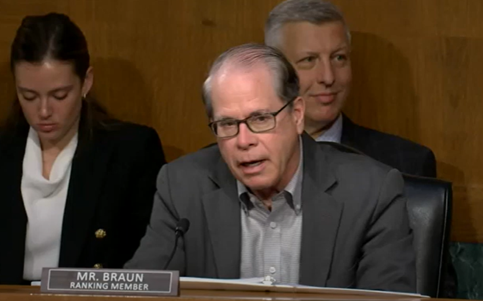Ranking Member Braun’s Opening Statement on Assisted Living Facilities Hearing
WASHINGTON—Today, Sen. Mike Braun, Ranking Member of the U.S. Special Committee on Aging, delivered the following opening remarks at the committee’s hearing entitled, “Assisted Living Facilities: Understanding Long-Term Care Options for Older Adults.” This hearing focused on the current state of assisted living facilities as part of the long-term care system in the United States for older adults and included topics such as services provided, costs and fees, and workforce.
Remarks as prepared:
By 2050, nearly one in four Americans will be 65 or older.
With this aging population comes an increased need for affordable, safe, and high-quality long-term care.
Assisted living facilities are an important option for individuals that may need some help, but not as much as a nursing home.
Today’s hearing will examine challenges facing assisted living facilities and highlight how states and these facilities are working to provide better care for our seniors.
Even one case of neglect is too many.
At the heart of the challenges that assisted living facilities face is a chronic workforce shortage that continues to grow.
An overburdened workforce can lead to issues with quality of care, neglect, and safety, resulting in the tragedies that we have all heard about.
Senator Kaine and I introduced the JOBS Act, which allows students to use federal Pell Grants for high-quality, short-term job training programs.
Senators Rosen, Collins, and I also introduced the Train More Nurses Act, which reviews all nursing grant programs to find ways to increase nursing pathways.
I am proud to say that this bill passed the Senate last night.
The federal government should make it easier for people to enter the healthcare workforce and for families to take care of their loved ones.
Right now, the Biden administration is making it harder by putting forward stifling measures that hurt providers and caregivers.
Nearly 50% independent contractors are caregivers. The Independent Contractor Rule could eliminate up to 87% of these jobs.
The Joint Employer Rule will put additional financial burden on long-term care organizations by expanding their liability.
While these federal regulations reduce seniors’ access to affordable quality care, state governments have the ability to increase access.
Unlike nursing homes that are regulated by both federal and state agencies, assisted living facilities are primarily regulated by states.
To increase safety and transparency, Indiana requires staffing ratios, dementia training and maintains a website that discloses reports and enforcement actions.
States and assisted living facilities are also working to find creative ways to use existing resources to assist seniors.
Indiana is using a combination of state and federal tools to provide more affordable assisted living to Hoosiers.
As a result, Indiana has seen affordability and quality improve. However, there is always more work to be done.
Some of my colleagues may be tempted to call for a shift towards increased federal involvement and regulation similar to nursing homes.
I believe that states are best positioned to meet the growing need for affordable, safe, and high-quality long-term care.
I look forward to hearing more about the challenges facing assisted living facilities, and how states and providers are working to meet the needs of their communities.
###
